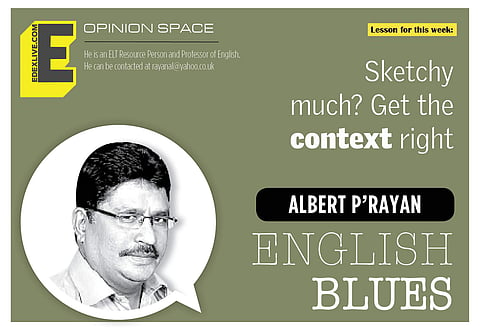

The expression ‘scanty and sketchy evidence’ was used in many news reports and tweets about climate activist Disha Ravi getting bail in the #ToolkitCase on February 23. This beautiful collocation, along with many other expressions, is found in the 18-page bail order by judge Dharmendra Rana. Some judges use language creatively and effectively. Their choice of words and phrases expresses their clarity of thought and conveys the intended message clearly. The judge who has authored the bail order has used many interesting and apt phrases which can help learners of English learn words in context. It is always better to learn words and phrases in context than in isolation. It is also better to learn words in chunks (collocations) rather than individual words. Let’s look at some of the phrases in the bail order.
“Considering the scanty and sketchy evidence available on record, I do not find any palpable reasons to breach the general rule of ‘Bail’.” In this sentence, the words in bold are collocations. What do the words ‘scanty’ and ‘sketchy’ mean in the sentence? Both the words have almost the same meaning: insufficient, inadequate, or scarce. By using the two words ‘scanty’ and ‘sketchy’ together, the judge emphasises the lack of evidence in the case connecting the activist to the violence that took place in Delhi on Republic Day. He also used the expression “not even an iota of evidence” when he said, “There is not even an iota of evidence brought to my notice connecting the perpetrators of the violence on January 26, 2021, with the said PJF or the applicant/accused.” The word ‘iota’ means an extremely small amount of something.
Here are other useful phrases with the word ‘evidence’:
1. In the face/teeth of evidence (= despite or in spite of evidence): I wonder why he wasn’t booked in the teeth of the evidence.
2. In the light of (the) evidence (= taking the evidence into consideration): In the light of the evidence, the activist was granted bail.
The word ‘toolkit’ has been used frequently recently ever since Swedish climate activist Greta Thunberg through her tweets voiced solidarity with the protesting Indian farmers. Disha Ravi was held in connection with the ‘Toolkit’ case. Judge Dharmendra Rana said in his order, “Creation of a WhatsApp group or being editor of an innocuous Toolkit is not an offense.” What is a ‘toolkit’? It has different meanings. In this context, it is a document created to explain in detail and provide information on how to support the cause’. In the beautiful collocation ‘an innocuous toolkit’, the word ‘innocuous’ has these meanings: harmless, inoffensive, not likely to arouse hostility.
On page 14 of the bail order, we find the sentence, “This 5000 years old civilization of ours has never been averse to ideas from varied quarters.” The phrase ‘5000 years old’ in the sentence functions as an adjective and therefore, it should be modified as ‘5000-year-old’. The phrase ‘being averse to something’ means ‘having a strong dislike to something’.
Quoting from Rig Veda, Judge Rana highlights the greatness of our cultural ethos, expressing our respect for divergent opinions: Let noble thoughts come to me from all directions.
